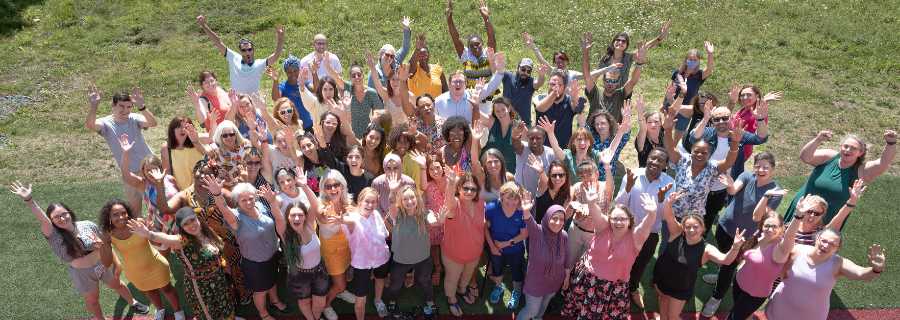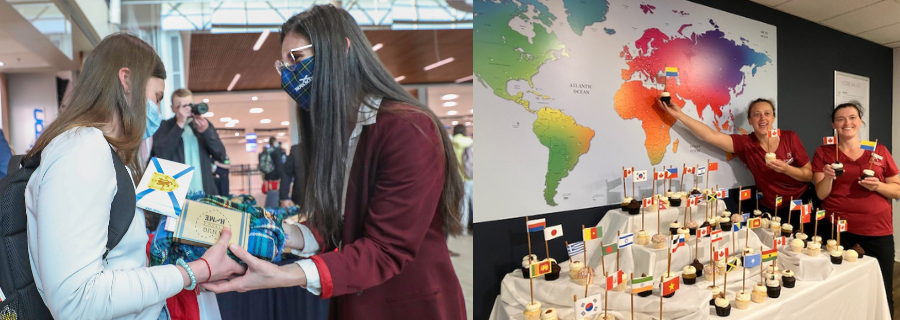In 2021, Nova Scotia reached a landmark population of 1 million — the fastest rate of growth in the province since 1976. Yet businesses and organizations in Nova Scotia, across many industries, are currently facing a labour shortage crisis. In July 2022, the Nova Scotia Apprenticeship Agency shared that the province will need over 11,000 skilled tradespeople by 2030. Similarly, following Hurricane Fiona, the Construction Association of Nova Scotia, suggested that “about 2,000 to 3,000 additional workers were needed for ongoing projects well before the storm hit.”
One way the province has sought to address labour needs and population growth is through immigration. In 2021, Nova Scotia welcomed a record-breaking 9,025 new permanent residents. To help sustain this growth, the federal government recently confirmed the province can approve 5,430 applicants to settle in Nova Scotia in 2022, a substantial increase from 3,857 the previous year.
The Immigration and Population Growth branch (IPG) of LSI focuses on making these goals a reality. “The IPG branch aims to attract, integrate, and retain immigrants and newcomers to the province by taking a lead role in engaging and working with partners to ensure Nova Scotia is well-positioned for growth,” says Ava Czapalay Deputy Minister of LSI. “Our vision is a welcoming province that sees greater numbers of immigrants and newcomers each year and recognizes the important contributions they make to Nova Scotia.”
One tool in their arsenal is the Atlantic Immigration Program (AIP), a federal program that helps employers meet their labour needs by recruiting international skilled workers and international graduates from Canadian institutions. The AIP is a pathway to permanent residence for those who want to work and live in Nova Scotia, New Brunswick, Prince Edward Island or Newfoundland and Labrador. “It's another tool that employers can use to fill labour gaps as they work to grow their businesses and fuel the provincial economy,” says Czapalay.
The Atlantic Immigration Pilot Program was launched in 2017 under the Atlantic Growth Strategy. “After five years as a highly successful pilot program, the Atlantic Immigration Program became a permanent pathway in 2022 for designated employers to hire skilled workers,” Czapalay notes. “The pilot program attracted 5,375 people to our province to live and work. That growth is vitally important to Nova Scotia and Atlantic Canada, filling our job vacancies, strengthening our communities, and striving towards our goal of two million people by 2060.”

Eligibility and support
Candidates for the AIP can be living overseas or living in Canada as temporary residents. Czapalay says that “having international workers in Nova Scotia means a diversified skillset, enriched workplace culture, and filled labour needs in our province.”
Fanny Ratisseau is the Chargée de développement at La Société de la Garderie Le Petit Voilier, a non-profit organization that manages seven francophone childcare centres in Halifax. “We used immigration to fill job postings due to the lack of Francophone qualified ECEs in Nova Scotia,” says Ratisseau. “There is a high demand for French childcare services, so international recruitment is essential for us to operate.”
The Atlantic Immigration Program can also be used to retain employees who already have work permits. Carol Logan, Director of Human Resources at The Prince George Hotel & Cambridge Suites Hotel Halifax, says that the AIP is a great tool for this purpose. “Using the Atlantic Immigration Program was a retention strategy for us,” she says. “Once we started to recruit and retain people, the immigration process and pathways to Permanent Residency became a part of our regular process.”
Czapalay notes that AIP is employer-led. Rather than the candidate, Nova Scotia businesses lead the application process — with the support of the Immigration and Population Growth Branch. Logan emphasizes how helpful the branch has been for The Prince George Hotel & Cambridge Suites Hotel Halifax.
“We have always been able to call the Nova Scotia Office of Immigration and Population Growth and have someone pick up the phone to help walk us through the process. We've also had information sessions where Leanne Bartlett has come on site to speak and give people the opportunity to ask questions. They've also offered virtual sessions that people could attend to understand the processes — it's always a phone call away.”

The benefits of designation
To start the AIP process, businesses first apply to become designated employers, and they are required to participate in intercultural competency training. The training requirement is a highlight for Logan. “The cultural competency training was really great,” she says. “It helps you have a different appreciation for the people joining your team. It helps you understand things like self-reflection, empathy, body language, and asking the right questions. To be an employer with competencies in cultural diversity and culture inclusion is like having First Aid and CPR training — it’s something we need to constantly be educating and refreshing ourselves in.”
The designation process also requires businesses to commit to working with a service provider organization to support welcoming workplaces and retention. Logan highlights the importance of partnerships when it comes to working with immigrant communities. “We've always been blessed with a diverse team of employees, and we recruited to fill positions working with our partners — organizations like ISANS, the YMCA, and local colleges and universities,” she says. “The time is now to understand immigration and how it can have a positive impact on your business. Reach out to partners that can help connect you to resources and walk you through the process.”
Strong partnerships are also integral for IPG’s goal of reaching two million residents in Nova Scotia by 2060. “We work with partners across the province in pursuit of this goal,” says Czapalay. “Our partners include settlement provider organizations, Nova Scotian employers, Regional Enterprise Networks, Local Immigration Partnerships, federal and provincial departments and agencies, and designated learning institutions."
Getting your business designated through the Atlantic Immigration Program brings immediate perks. “Being designated is a recruitment strategy,” says Logan. “Because we know that applicants will apply to employers that are designated. Being designated publicly on the website for Nova Scotia Office of Immigration and Population Growth is an attraction. People send us resumes from across the globe.”
While Le Petit Voilier has not yet made use of the AIP, Ratisseau agrees that there are benefits to attaining the designation. “We have used the Francophone Mobility, Skilled Worker, and Nova Scotia Experience: Express Entry programs,” says Ratisseau. “We are very satisfied with these three programs but being designated under the AIP gives us access to the IRCC Dedicated Service Channel, which has been helpful to obtain answers regarding current applications and general guidance on immigration matters.”

Building inclusive communities
After employers receive their designation, they can then apply to endorse candidates. “Once endorsed, those candidates submit Permanent Residency applications to Immigration, Refugees and Citizenship Canada,” says Czapalay. “They also have the option to apply for work permits so they can come to Nova Scotia to work while awaiting Permanent Residency. Employers can then hire immigrant talent once they have demonstrated that they have attempted to find workers through domestic recruitment.”
Ratisseau offers tips to employers who are welcoming newcomers to the workplace. “It is important for us to be in contact with the future employee throughout the work permit application process to answer questions and create a connection,” she says. “On arrival, we pick up the employee from the airport, offer to go grocery shopping, and accompany them to complete administrative procedures like creating a bank account.” Le Petit Voilier also offers networking opportunities, ESL courses, and access to bilingual virtual healthcare.
Once an employee settles into the workplace, word-of-mouth endorsements can help continue the positive trend. “Once we hire people, the positive and reputation of the hotel is set out and they refer friends, family members, or community members,” says Logan. “Without immigration, we wouldn't be as strong of a business as we are now. Business came back fast to the hotel, and we were able to staff because of people who chose Nova Scotia as their new path in life or as an opportunity.”
While programs like the Atlantic Immigration Program have helped lay the groundwork to Permanent Residency, there are still roadblocks for newcomers to Canada. In a recent report, Stewart McKelvey highlighted that Immigration, Refugees and Citizenship Canada (IRCC) “boasted record admissions of permanent residents” in 2021, but that “at the end of July 2022, over 50% of applications in IRCC’s inventory were considered to be backlogged.”
This backlog makes support programs essential when it comes to helping newcomers settle and foster a sense of belonging. “In 2022, the province increased funding to Newcomer Health Clinic, further ensuring newcomers have the supports they need when they arrive in Nova Scotia,” says Czapalay. Logan recognizes the importance of these support systems: “It helps newcomers and immigrants build relationships with employers, so they start to build community connection.” These relationships are integral to success, she adds. “Really, it boils down to how we help our neighbors. How do we support each other? By creating communities within communities.”
Learn more about the Atlantic Immigration Program by visiting:
novascotiaimmigration.com/help-for-employers/atlantic-immigration-program
Or, contact Labour, Skills and Immigration: Immigration and Population Growth branch’s employer support team at (902)424-5230 or immigration@novascotia.ca
< Back to Articles | Topics: Cover story

